Filed under: Featured, Housing, International Coverage
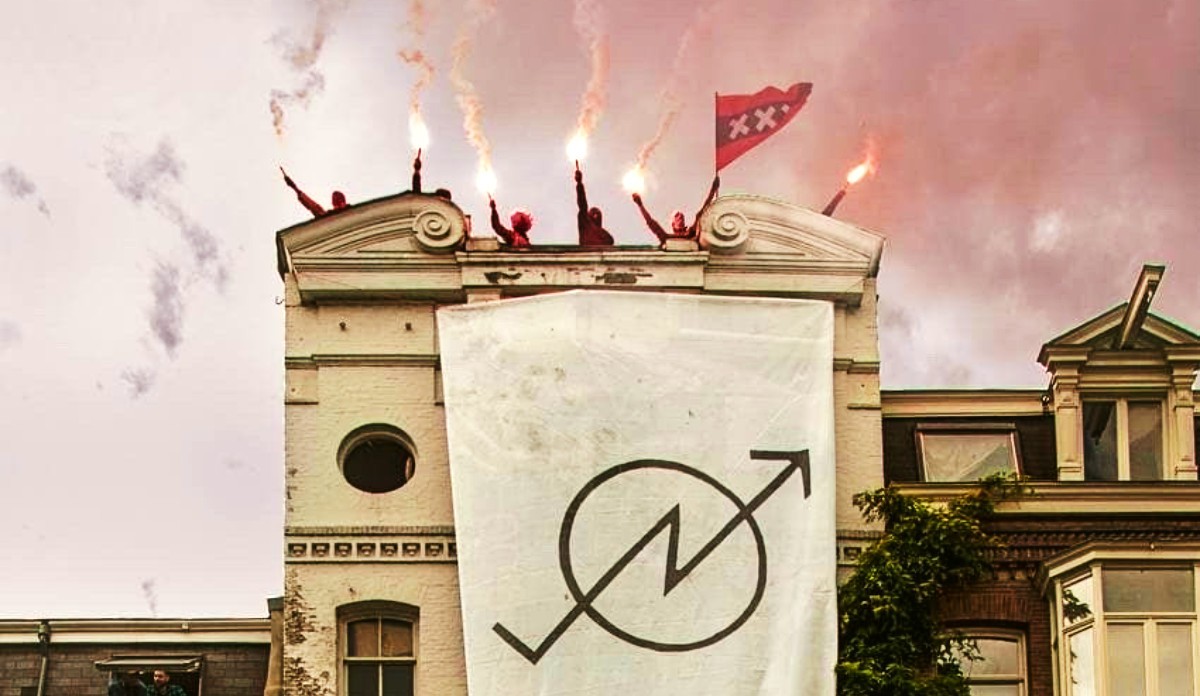
Our latest contribution comes from an anarchist in the Netherlands, and details the positions and possibilities of an exciting resurgence of housing struggle there after a decade of relative quiet. For those interested in the history of squatting in the Netherlands, we recommend this brief section (starting page 111) from The Subversion of Politics: European Autonomous Social Movements and the Decolonization of Everyday Life by Georgy Katsiaficas, published by AK Press.
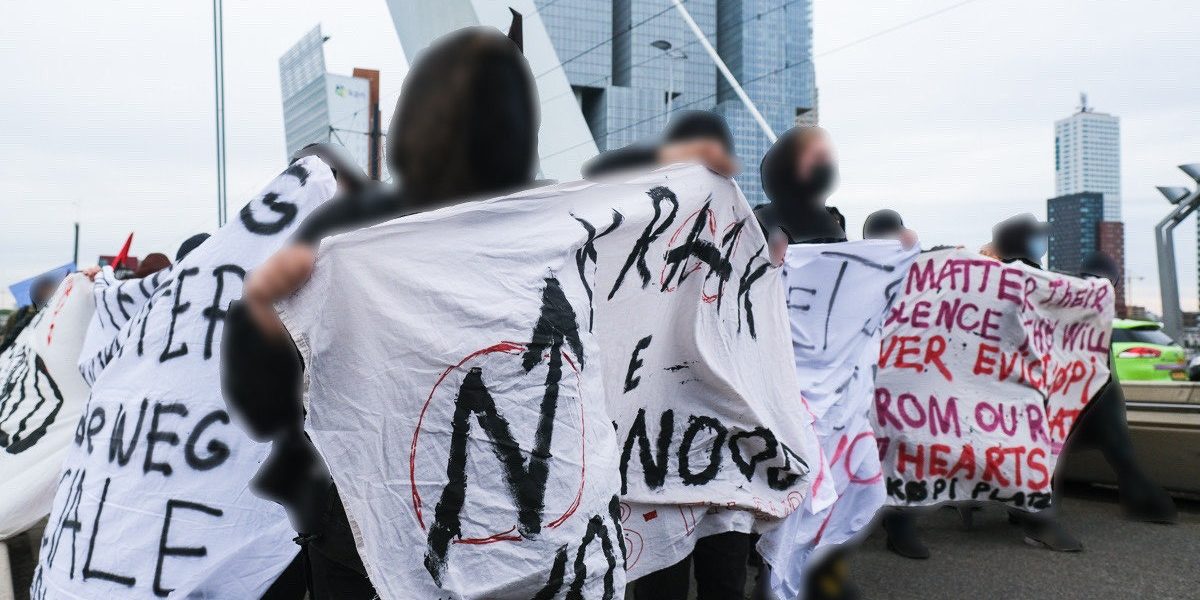
After decades of neoliberal housing policies, endorsed and implemented not only by right-wing neoliberals but just as much by green liberal and social democratic parties, housing in the Netherlands has become fully out of reach for anyone but the wealthy. Housing struggle had mostly gone dormant since the squatting ban of 2010, but over recent months a new movement has formed, largely springing from a mixture of grassroots renters’ rights, socialist and anarchist organizations and squatting activists.
The Netherlands used to have a fair amount of lower-cost “social housing,” something that can be attributed in part to the squatting movements of the late ’60s through the ’80s, which helped force the government to provide affordable housing. Social housing was mainly realized through social housing corporations, which were state-financed non-profit institutions that provided affordable rental houses. That system has gradually been broken down over the past decades; in the ’90s these corporations were turned into for-profit organizations, which led to a gradual but massive selling out of social housing to the commercial market.
By the start of the economic crisis in 2009, the waiting lists for social housing had risen to 15+ years for most cities, while the need for such housing kept growing due to growing precarity amongst workers. This effectively meant everyone in need of housing became entirely dependent on free market housing. For the past 11 years the Netherlands has been ruled by the neoliberal VVD party, alongside the right-wing christian democrats and the centrist social democrats. This gave the housing shortage a final push as these coalitions introduced a tax on social housing in order to finance the bankers bailout during the economic crisis. Simultaneously these coalitions did away with most renters’ rights in order to attract foreign investors.
As of 2016, any free-market rental contract is by definition temporary. Contracts are signed for one year only, to be prolonged indefinitely if the owner wishes to do so. This was introduced by the neoliberal party as a measure to combat the housing shortage, proving once again they are some of the most cynical creatures to walk this planet. Anyone protesting their contract conditions will be kicked out at the end of their one-year term, and thus is left with no option but to take whatever shit their landlord throws at them.
Fast-forward to the present: the extreme economic liberalization of the housing market combined with the near-abolishment of rental rights unsurprisingly has led to rent prices exploding throughout the entire country. Monthly rent on average is nearly the equivalent of minimum wage. Needless to say, housing has become a huge issue for everyone but the rich. Already it is not uncommon for students to have to drop out of their studies because they can’t find housing in proximity to the university, and homelessness has doubled over the past ten years.
More and more people are forced to remain living with their parents. This is particularly impacting poor people and people on welfare, since the government reduced welfare to people who live with multiple adults in one household. This was another measure stemming from the ruling neoliberal party efforts to force people to work. All of this is developing in the aftermath of a huge scandal in which the tax office illegally forced many thousands of victims to pay back childcare benefits, often demanding tens of thousands of euros from lower-income families. Something that had been happening structurally was proven to be deliberate policy.
This financial assault on the poor, in which people with immigrant backgrounds were particularly targeted, led to at least one suicide and more than a thousand children being taken away from their parents and placed in foster care, as the state deemed their parents ‘financially incapable’ of taking care of them. The revelation that this, during all this time, had been conscious policy enforced by the very highest ranks in the tax department and government, unfolded into a huge scandal which led to the government having to step down.
The political system in the Netherlands is a multi-party system in which the party that gets most votes will generally form alliances with likeminded parties in order to obtain a majority seat count in the parliament. One would think there would be zero chance that the individuals responsible for the scandal, in particular Prime Minister Mark Rutte, would run for office again, let alone that people would vote this party into power again. However, nearly a year after the government officially stepped down over this scandal, we are waiting on these very same people to again form a government after again successfully becoming the biggest party in the Dutch elections.
The state’s extreme cynicism and lack of accountability offer little to no hope of any serious government intervention in the current housing crisis. The Netherlands still tends to hold up some image of itself as a tolerant welfare state, something the ruling parties still like to take credit for. The extreme neoliberal paradigm shift that has gradually came to maturity over the past two decades supplants this fairy tale and we start to see the first signs of an entire generation being left behind.
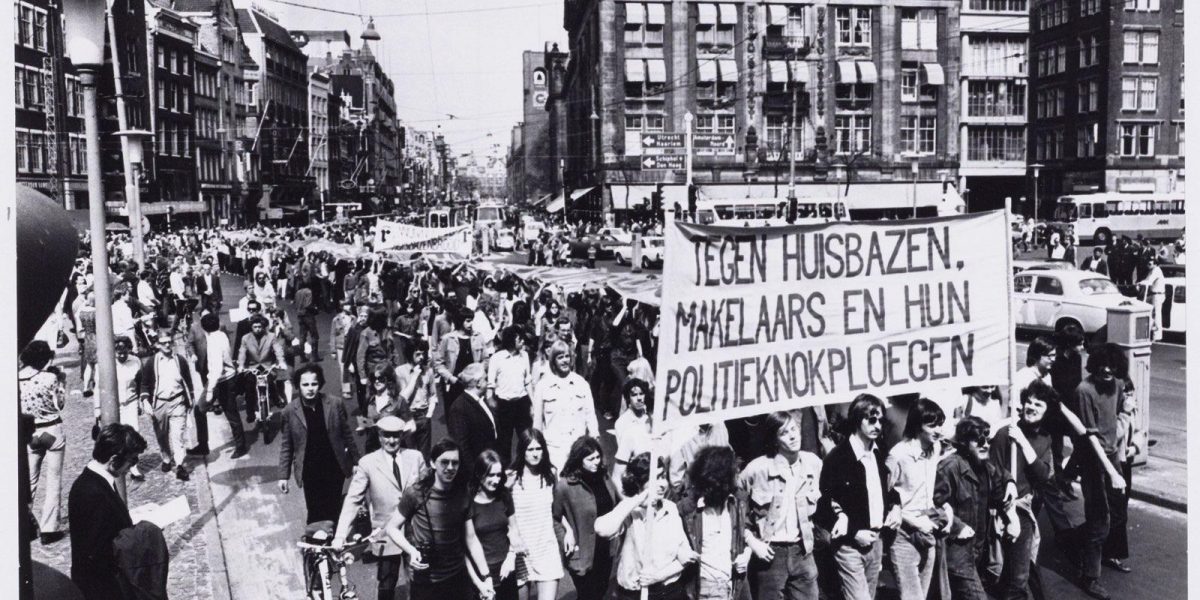
Dutch Housing protest, May 9 1970. Banner reads (roughly) “Against the landlords and their police thugs”
The Netherlands, despite a long history of housing struggle from the ’60s through the ’80s, has seen little widespread social unrest since. In the past month, however, two large housing protests have happened: first on September 12 in Amsterdam, with roughly 15,000 people attending, and then one October 17 in Rotterdam which was attended by almost 10,000 people. It is notable that these protests, initiated by a broad coalition of leftist and grassroots groups, were very outspokenly supportive of squatting.
Although anarchists were not explicitly involved in the organisational aspects of the demonstrations, we had a clear presence in them and could perhaps even be considered the bridge between the bigger housing movement and the practice of squatting. It would be fair to say the squatting movement in the Netherlands is nearly synonymous with the anarchist and radical left movement in recent years.
It is clear that the state is very anxious about this presence within the protests and the potential for both their actions and ideas to spread to a wider audience. In Amsterdam, anarchists were targeted before the protest even started, resulting in several arrests. This was only a subtle taste of what was to come; as the march approached its endpoint a small group split off the demonstration with the intend to squat a house. They were instantly met with massive amounts of police who used some of the most relentless violence we have witnessed in a long time. More than 60 people got arrested and severely beaten up. It’s worth noting that all this is happening under the authority of green left mayor Femke Halsema. The day after the demonstration the Amsterdam police even released a half-baked video in which they tried to justify their reaction, stating that ‘these extreme elements’ had nothing to do with the protest or other protesters or the housing struggle and were only there to break the law. This was clearly aiming to splinter this new alliance of squatters, anarchists and the broader left. The police statement was utterly laughable even to people who are not supportive of squatting, as it completely contradicts Dutch social history.
On October 16, an annual protest in Amsterdam was held in defence of autonomous cultural spaces. During this protest a massive house in the very centre of Amsterdam was squatted and dubbed “Hotel Mokum.” Mokum is the name for Amsterdam in Jiddisch, the language a lot of working-class Amsterdam dialect has its roots in. Hotel Mokum, still occupied at the time of writing, is the first large-scale successful occupation related to these protests.
The next day was the protest in Rotterdam. Police presence again was massive from the start. A huge number of the notoriously violent ‘stillen’, the Dutch civil cops who function as snatch squads for the riot cops, were present in and around the demonstration and trying to mingle particularly with the anarchist bloc. They were more intense than usual, actively participating in chanting slogans, carrying protest signs, putting stickers on their jackets and so on. Despite the provocative police presence, the protest started as planned. When the protest reached the bridge that connects the south of the city (where the demo started) to the centre of Rotterdam, several lines of riot cops started encircling the anarchist bloc. The cops then formed a kettle and tried to separate the anarchist bloc from the rest of the demonstration. The rest of the protest refused to continue walking, and the anarchist bloc tried to break out of the kettle with partial success. What followed was an hour-long standoff with all the protesters (still a good few thousand) refusing to leave the bridge. During this time several small clashes occurred. Again, many people were severely beaten by police.
All in all, it was a clearly unprovoked attack by the police in an attempt to separate ‘the anarchists’ from the wider housing movement, a tactic obviously decided upon in advance. It resulted in a massive mask-off moment: the cops, who will serve as the dogs of neoliberal politicians with no second thought, now witnessed by thousands of people who might otherwise not have been open to this longstanding truth.
Wtf joh politiegeweld #woonopstand pic.twitter.com/SCgwwVthxt
— Kunsttranen🏴🏳️ (@kunsttranen) October 17, 2021
What is particularly interesting in this situation, and what explains the anxiety from the state, is that the anarchists have something crucial to bring to the table.
It’s common sense that within the current political reality, nothing will change about the housing situation. It very much feels like a majority of the protesters understand a wider social movement is required to force the government to address the crisis. Even the most liberal leftist in the march will probably acknowledge that just asking isn’t going to be enough. Everyone knows the government will not do this voluntarily and that street protests are only a part of the story.
Despite not universally having a background in radical politics, all of the organizers of these protests have refused to accept the divisive narrative of the state. They have stood in clear and open solidarity with the victims of police violence and stated explicit support for squatting as a legitimized method of protesting the housing crisis. This is something new, and can only spring from a generation that realizes the government does not give two fucks about them. As privileged as most of us are over here, this perspective was not a widespread realisation before, and cannot be separated from the shameless and cynical neoliberal agenda we were made to swallow for years.
This opens an entire new political reality for anarchists to operate in. The seemingly invincible, paralyzing status quo created by the social democrats has disappeared. This is not only apparent on the social side of politics, which now finds its first flashpoint on the topic of housing struggle, but is equally apparent on the right, as shown by the growing foothold of Dutch fascist movements such as FVD, PVV and the appeal of the anti-vax movement. These groups, so far unsuccessfully, have tried to co-opt the housing struggle by blaming it on immigrants.
For a long time the Dutch left has been led by and represents young, wealthy and well-educated people and has done nothing for the marginalized, the working class and the poor people of this country. The parliamentary left is not even remotely qualified to be called an alternative to the neoliberal agenda and in fact has universally shifted to the center, becoming an absolute caricature of what they once were. This has contributed to the appeal of the fascist movements who present themselves as a counter-power against “the elite.” Needless to say, little could be further from the truth.
The absence of a social movement as an alternative to neoliberal politics gives fascists a monopoly as an alternative to the status quo. This current moment is therefore not only valuable in the context of the housing crisis but is simultaneously crucial in a wider sense: both to realize a widespread social counter-movement to neoliberalism and to counter the answers fascists offer. We cannot cede that space to them, and we have never been in a moment where we, as anarchists, were better suited to fill the void of a counter-movement. Housing struggle has historically been the space of anarchists and the radical left, and remains so today.
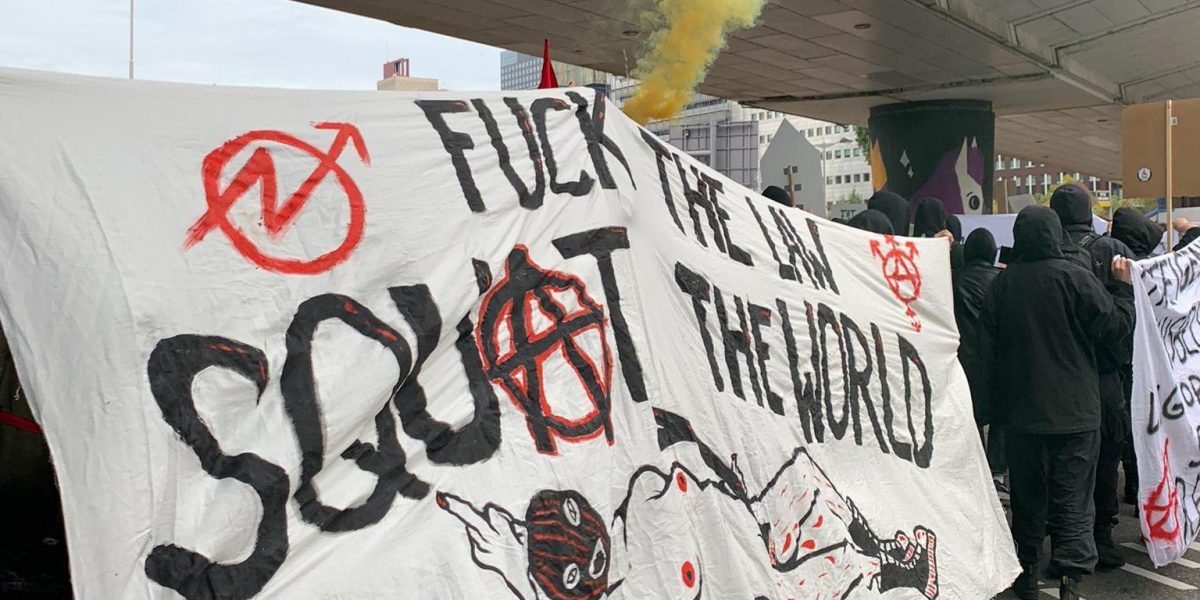
For the next two months protests are planned in small and big cities on a weekly basis. It remains to be seen if the movement can maintain its momentum, especially after fierce police repression. The appearance of new anti-repression groups forming as a result of those protests is a first move into the right direction, to build a movement that is capable of dealing with repression instead of being crushed by it.
Anarchist presence in these protests should of course be maintained and will hopefully grow in the near future. Having said that, arguably one of the biggest dangers of past weeks’ repression, and most likely its very purpose, is that all of these protests are made to be about anarchists. We should look critically into how we got here and what is at stake and beware getting used as a tool to shatter a social movement in its infancy. These protests should not be about us; that is what the state wants. Instead, these protests are about the hundreds of thousands of people living one paycheck away from homelessness and about the people whose lives have been ruined by the state’s war against the poor. They are not in need of ideology. They are in need of dignity. Since the state will not offer that, maybe we can fight side-by-side with these people and share some tools for liberation. We are there as accomplices in the quest for a dignified life.
Never having trusted the state in providing for basic necessities, being familiar with anti-repression organizing, being familiar and comfortable with militance in political struggle, it is exactly anarchists who can help this movement mature. This can be done through classical anarchist practices. Via direct action, mutual aid and expropriation, all culminating in the practice of squatting, we can set the scene for a new age of social struggle. This social struggle will happen with or without us, and is bigger than just housing. It is about neoliberalism attempting to crush all of us.
The emerging movement has potential to connect our struggles with the struggles of others who also hate the rich, their cops and their politicians. We’re now sitting on a bomb, and anarchists are the only ones who have the matches.
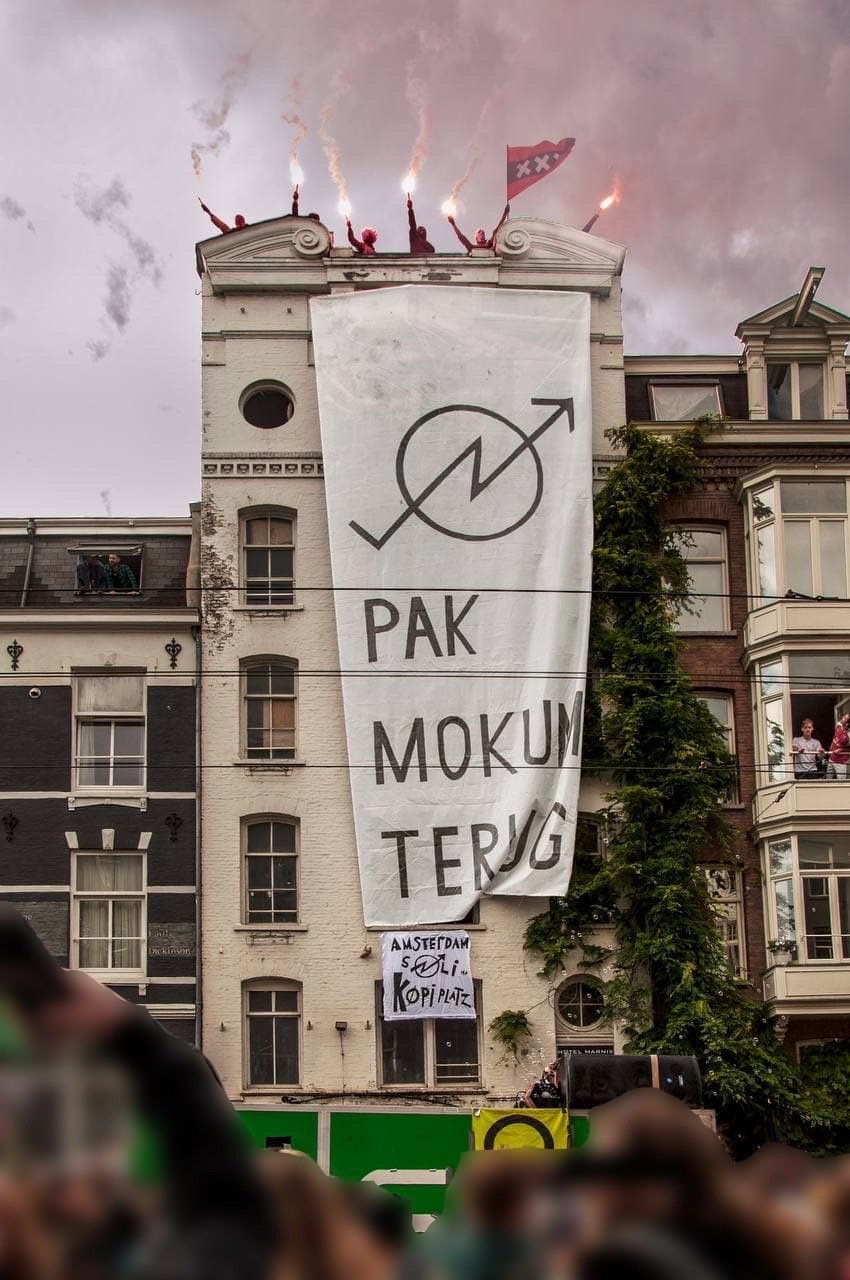
The newly occupied Hotel Mokum squat in Amsterdam





